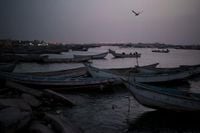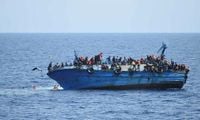Tragedy struck off the coast of West Africa this week as a migrant boat, packed with hopeful travelers seeking a better life, capsized off Mauritania, resulting in a devastating loss of life. According to statements from Gambia’s foreign affairs ministry and the Mauritanian coast guard, at least 70 people have been confirmed dead, with dozens more still missing and feared lost at sea. This incident, which unfolded in the early hours of Wednesday near the Mauritanian town of Mheijrat, has quickly become one of the deadliest disasters along the Atlantic migration route in recent years.
The ill-fated vessel, which set sail from Gambia about a week prior, was carrying an estimated 150 to 160 passengers, most of whom were Gambian and Senegalese nationals. The Mauritanian coast guard, speaking to The Associated Press, reported that only 16 to 17 individuals have been rescued so far, leaving the fate of nearly 100 others uncertain. "When the migrants saw the lights of Mheijrat, they tried to move to one part of the boat, causing it to capsize," explained Mohamed Abdallah, the head of the Mauritanian coast guard. The tragedy unfolded in a matter of moments, as the collective hope of reaching European shores turned into a desperate fight for survival.
Authorities worked tirelessly in the aftermath, recovering 70 bodies on Wednesday and Thursday. Yet, witness accounts suggest that the true number of casualties may be even higher, with some reports indicating that over 100 lives could have been lost in the disaster. The scale of the tragedy has sent shockwaves through the region, reviving painful memories of similar incidents that have plagued these waters for years.
The Atlantic migration route, stretching from the coast of West Africa to Spain’s Canary Islands, has long held a grim reputation as one of the world’s most dangerous passages for migrants. According to the European Union, more than 46,000 irregular migrants reached the Canary Islands in 2024 alone—a record figure that underscores both the desperation and determination driving these journeys. The human cost, however, is staggering: rights group Caminando Fronteras estimates that more than 10,000 people died attempting the journey in 2024, marking a 58 percent increase over the previous year.
Gambia’s foreign affairs ministry, in a statement released late Friday, implored its citizens to reconsider these perilous crossings. "We urge our nationals to refrain from embarking on such perilous journeys, which continue to claim the lives of many," the ministry stated, echoing the grief and frustration felt by families left behind.
This latest catastrophe is not an isolated event. Just last year, a similar incident off Mauritania claimed the lives of more than a dozen migrants, with 150 others declared missing. The waters off Mauritania have become a major artery for migrants from sub-Saharan Africa, as economic opportunities dwindle and political instability rises across the region. The lure of Europe, with its promise of safety and prosperity, remains powerful despite the mounting risks.
Mauritania, for its part, has found itself at the center of Europe’s efforts to stem the flow of irregular migration. In 2024, the country signed a 210 million-euro deal with the European Union, aimed at deterring migrants from using its territory as a launching point for the journey north. The agreement, worth roughly $225 million, has led to tighter controls and increased expulsions of migrants. However, human rights groups have raised concerns about abuses during these crackdowns, warning that desperate individuals are being caught in a web of violence and neglect as they transit through the country.
Despite these efforts, the number of migrants attempting the Atlantic crossing continues to surge. Earlier in August, more than 30 boats carrying about 600 irregular migrants arrived in Spain’s Balearic Islands within just a few days. This spike has been attributed to a shift in migratory routes, as authorities crack down on traditional departure points and smugglers seek new paths to Europe. Official data shows that irregular migration to Spain’s Balearics has risen by a staggering 170 percent in the first half of 2025, reaching around 3,000 people. The number of boats departing, mostly from Algeria, has more than doubled.
For those who survive the journey, the relief is palpable. Konestory, a 20-year-old South Sudanese migrant who recently arrived in Mallorca, recounted his harrowing experience to Reuters. He paid $2,000 to board a boat from Algeria, which took 46 hours to reach the islands. "We faced a lot of waves, ran out of food and water, and got lost," he recalled. "Now I'm happy. I'm looking at ways to talk to my mom to give her the information that I reached here." Such stories are bittersweet, highlighting both the dangers endured and the hope that drives so many to risk everything.
Meanwhile, authorities in the Balearic Islands are sounding the alarm. They fear their region could become the next major gateway for migrants, much like the Canary Islands at the height of its influx in 2024, when 47,000 people arrived from West Africa. While arrivals in the Canaries have dropped by 46 percent in the first seven months of 2025—largely due to Mauritania’s tightened controls—the pressure on other routes is mounting.
The crisis is not confined to West Africa and Spain. Across the Mediterranean, similar tragedies continue to unfold. On Saturday morning, an adult man and a girl were found dead on a beach on the Greek island of Rhodes, victims of another failed attempt to reach Europe. According to the Greek Coastguard, the pair had been aboard a smuggler’s inflatable boat that was abandoned near the coast after departing from Turkiye. Thirty-eight other migrants were found nearby, and all survivors were transferred to the island’s port authority for processing. In response to the ongoing surge in arrivals, Greece has declared a three-month suspension on asylum requests from anyone arriving by sea from North Africa.
As the summer of 2025 draws to a close, the scale of the migration crisis in West Africa and the Mediterranean is becoming ever more apparent. The deadly capsizing off Mauritania is a stark reminder of the risks faced by those seeking a better future—and of the urgent need for coordinated action to address the root causes driving these perilous journeys. For now, families across Gambia, Senegal, and beyond are left to mourn, their hopes dashed by the unforgiving waters of the Atlantic.


